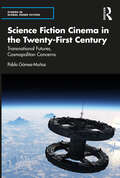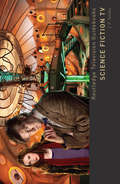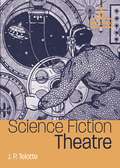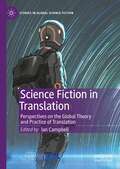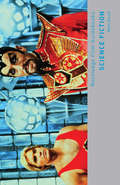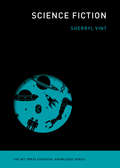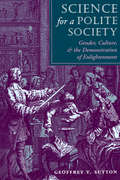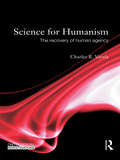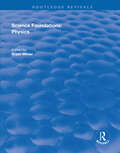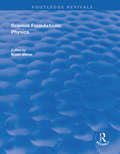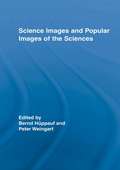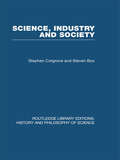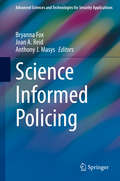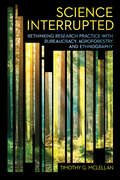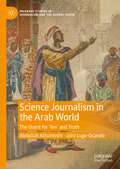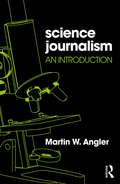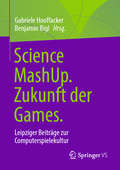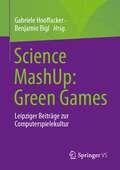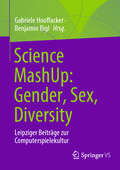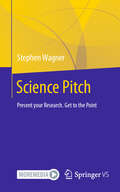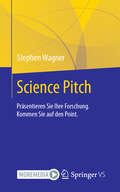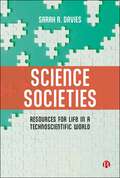- Table View
- List View
Science Fiction Cinema in the Twenty-First Century: Transnational Futures, Cosmopolitan Concerns (Studies in Global Genre Fiction)
by Pablo Gómez-MuñozRecent films are increasingly using themes and conventions of science fiction such as dystopian societies, catastrophic environmental disasters, apocalyptic scenarios, aliens, monsters, time travel, teleportation, and supernatural abilities to address cosmopolitan concerns such as human rights, climate change, economic precarity, and mobility. This book identifies and analyses the new transnational turn towards cosmopolitanism in science fiction cinema since the beginning of the twenty-first century. The book considers a wide selection of examples, including case studies of films such as Elysium, In Time, 2012, Andrew Niccol’s The Host, Codependent Lesbian Space Alien Seeks Same, and Cloud Atlas. It also questions the seeming cosmopolitanism of these narratives and exposes how they sometimes reproduce social hierarchies and exploitative practices. Dealing with diverse, interdisciplinary concerns represented in cinema, this book in the Studies in Global Genre Fiction series will be of interest to readers and scholars working in the fields of science fiction, film and media studies, cosmopolitanism, border theory, popular culture, and cultural studies. It will also appeal to fans of science fiction cinema and literature.
Science Fiction Cinema in the Twenty-First Century: Transnational Futures, Cosmopolitan Concerns (Studies in Global Genre Fiction)
by Pablo Gómez-MuñozRecent films are increasingly using themes and conventions of science fiction such as dystopian societies, catastrophic environmental disasters, apocalyptic scenarios, aliens, monsters, time travel, teleportation, and supernatural abilities to address cosmopolitan concerns such as human rights, climate change, economic precarity, and mobility. This book identifies and analyses the new transnational turn towards cosmopolitanism in science fiction cinema since the beginning of the twenty-first century.The book considers a wide selection of examples, including case studies of films such as Elysium, In Time, 2012, Andrew Niccol’s The Host, Codependent Lesbian Space Alien Seeks Same, and Cloud Atlas. It also questions the seeming cosmopolitanism of these narratives and exposes how they sometimes reproduce social hierarchies and exploitative practices.Dealing with diverse, interdisciplinary concerns represented in cinema, this book in the Studies in Global Genre Fiction series will be of interest to readers and scholars working in the fields of science fiction, film and media studies, cosmopolitanism, border theory, popular culture, and cultural studies. It will also appeal to fans of science fiction cinema and literature.
Science Fiction TV (Routledge Television Guidebooks)
by J. P. TelotteThe first in the Routledge Television Guidebooks series, Science Fiction TV offers an introduction to the versatile and evolving genre of science fiction television, combining historical overview with textual readings to analyze its development and ever-increasing popularity. J. P. Telotte discusses science fiction’s cultural progressiveness and the breadth of its technological and narrative possibilities, exploring SFTV from its roots in the pulp magazines and radio serials of the 1930s all the way up to the present. From formative series like Captain Video to contemporary, cutting-edge shows like Firefly and long-lived popular revivals such as Doctor Who and Star Trek, Telotte insightfully tracks the history and growth of this crucial genre, along with its dedicated fandom and special venues, such as the Syfy Channel. In addition, each chapter features an in-depth exploration of a range of key historical and contemporary series, including: -Captain Video and His Video Rangers -The Twilight Zone -Battlestar Galactica -Farscape -Fringe Incorporating a comprehensive videography, discussion questions, and a detailed bibliography for additional reading, J. P. Telotte has created a concise yet thought-provoking guide to SFTV, a book that will appeal not only to dedicated science fiction fans but to students of popular culture and media as well.
Science Fiction Theatre (TV Milestones Series)
by J. P. TelotteIn the wake of the juvenile space operas of the early 1950s, a groundbreaking series debuted and paved the way for one of viewers’ favorite genres today: adult-oriented science fiction. Science Fiction Theatre aired with a fresh anthology-style narrative from the vision of veteran producer Ivan Tors and with compelling narration by Truman Bradley. Created by industry-leading syndicator Ziv Television Programs, the show pioneered a scientifically based approach to aliens, telepathy, and the mysteries of the universe that provided a model for Rod Serling’s The Twilight Zone (1959–64) and a myriad of acclaimed programs that followed, including The Outer Limits (1963–65), The Ray Bradbury Theater (1985–92),and Black Mirror (2011–present). This book contextualizes Science Fiction Theatre within the budding American television industry of the 1950s, as powerful networks and independent producers and syndicators vied to create and distribute programming to an audience eager to embrace this new, free medium. Including a complete videography of this historically neglected series, author J. P. Telotte illuminates Science Fiction Theatre as a touchstone for understanding the development of science fiction media and the dynamic nature of early television broadcasting.
Science Fiction in Translation: Perspectives on the Global Theory and Practice of Translation (Studies in Global Science Fiction)
by Ian CampbellScience Fiction in Translation: Perspectives on the Global Theory and Practice of Translation focuses on the process of translation and its implications. The volume explores the translation of works of science fiction (SF) from one language to another and the translation of SF tropes, terms, and ideas of SF theory into cultures outside the West. Providing a comprehensive examination of the state of translation into English, the essays consider how representative the body of translated work of SF is from the source language/culture. It also considers the social, political, and economic choices in selecting a work to translate. The book illustrates the dramatic growth both in SF production outside the Anglosphere, the translation of works from other languages into English, and the practice of translating English-language SF into other languages. Altogether, the essays map the theory, practice, and business of SF translation around the world.
Science Fiction: Marxism And Science Fiction (Routledge Film Guidebooks)
by Dr Mark BouldScience Fiction explores the genre from 1895 to the present day, drawing on examples from over forty countries. It raises questions about the relationship between science fiction, science and technology, and examines the interrelationships between spectacle, narrative and self-reflexivity, paying particular attention to the role of special effects in creating meaning and affect. It explores science fiction’s evocations of the sublime, the grotesque, and the camp, and charts the ways in which the genre reproduces and articulates discourses of colonialism, imperialism and neo-liberal globalization. At the same time, Science Fiction provides a thorough analysis of the genre’s representation of race, class, gender and sexuality, making this text an essential guide for students, academics and film fans alike. Key films discussed include: Le voyage dans la lune (1902) 20,000 Leagues under the Sea (1916) L’Atlantide (1921) King Kong (1933, 2005) Gojira (1954) La Jetée (1962) The Abominable Dr Phibes (1971) Tetsuo (1989) Sleep Dealer (2008) Avatar (2009)
Science Fiction: Science Fiction And The Question Of The Animal (The MIT Press Essential Knowledge series #39)
by Sherryl VintHow science fiction has been a tool for understanding and living through rapid technological change.The world today seems to be slipping into a science fiction future. We have phones that speak to us, cars that drive themselves, and connected devices that communicate with each other in languages we don't understand. Depending the news of the day, we inhabit either a technological utopia or Brave New World nightmare. This volume in the MIT Press Essential Knowledge surveys the uses of science fiction. It focuses on what is at the core of all definitions of science fiction: a vision of the world made otherwise and what possibilities might flow from such otherness.
Science For A Polite Society: Gender, Culture, And The Demonstration Of Enlightenment
by Geoffrey V. SuttonTraditional accounts of the scientific revolution focus on such thinkers as Copernicus, Galileo, and Newton, and usually portray it as a process of steady, rational progress. There is another side to this story, and its protagonists are more likely to be women than men, dilettante aristocrats than highly educated natural philosophers. The setting is not the laboratory, but rather the literary salons of seventeenth- and eighteenth-century France, and the action takes place sometime between Europe's last great witch hunts and the emergence of the modern world.Science for a Polite Society is an intriguing reexamination of the social, cultural, and intellectual context of the origins of modern science. The elite of French society accepted science largely because of their personal involvement and fascination with the emerging philosophy of nature. Members of salon society, especially women, were avid readers of works of natural philosophy and active participants in experiments for the edification of their peers. Some of these women went on to champion the new science and played a significant role in securing its acceptance by polite society.As Geoffrey Sutton points out, the sheer entertainment value of startling displays of electricity and chemical explosions would have played an important role in persuading the skeptical. We can only imagine the effects of such drawing-room experiments on an audience that lived in a world illuminated by tallow candles. For many, leaping electrical arcs and window-rattling detonations must have been as convincing as Newton's mathematically elegant description of the motions of the planets.With the acceptance and triumph of the new science came a prestige that made it a model of what rationality should be. The Enlightenment adopted the methods of scientific thought as the model for human progress. To be an ?enlightened? thinker meant believing that the application of scientific methods could reform political and economic life, to the lasting benefit of humanity. We live with the ambiguous results of that legacy even today, although in our own century we are perhaps more impressed by the ability of science to frighten, rather than to awe and entertain.
Science For Humanism: The Recovery of Human Agency
by Charles R. VarelaIn the 18th century, the pre-modern Judeo-Greco-Christian problem of freedom and determinism is transformed by Kant into the modern problem of the freedom of human agency in the natural and cultural worlds of deterministic structures; it is this version of the freedom and determinism issue which centres the Science and Humanism debates, and thus marks the history of the social sciences. Anthony Giddens is credited with providing the new vocabulary of ‘structure’ and ‘agency’ in order to formulate the problem of freedom and determinism in those terms, thus making this formulation fruitful. In this book, Charles R. Varela proposes that Kant originally formulated this problem, and makes a series of wide-ranging and groundbreaking observations based on Kant's metaphysics of realism which enables Varela to propose a solution to the structure/agency problem. Subjects revisited in this book include: · "Giddens’ Call" · The stalemate of the social and psychological sciences · The determinist tradition of modern science · Postmodernism This breadth of themes, drawn together by Varela with his work on Kant, fully realizes Giddens’ principle that human agency is a real causal force. It is Kant's conception of causal power that is the causal force Giddens' has called for. Science For Humanism: The Recovery of Human Agency will be of particular interest to students of humanism and therefore realism, Kant and Giddens.
Science Foundations: Physics (Routledge Revivals)
by Bryan MilnerThis title was first published in 2001. The new edition of Science Foundations provides comprehensive coverage of single- and double-award GCSE science. It is fully revised and updated to match the new GCSE specifications, for teaching from September 2001. It contains all the material required for the foundation and higher tiers, with clear progression and explicit differentiation. 'Higher tier only' material is clearly marked in separate spreads. The language level is carefully controlled, with illustrations and layout specifically designed to make the concepts accessible. There are frequent opportunities for students to confirm their understanding of each key idea as it is introduced, via short questions and summary passages on each spread. The books include guidance for students on how to prepare for and answer their GCSE examinations, and a glossary of key words for ease of reference.
Science Foundations: Physics Supplementary Materials (Science Foundations Ser.)
by Bryan MilnerThis title was first published in 2001. The new edition of Science Foundations provides comprehensive coverage of single- and double-award GCSE science. It is fully revised and updated to match the new GCSE specifications, for teaching from September 2001. It contains all the material required for the foundation and higher tiers, with clear progression and explicit differentiation. 'Higher tier only' material is clearly marked in separate spreads. The language level is carefully controlled, with illustrations and layout specifically designed to make the concepts accessible. There are frequent opportunities for students to confirm their understanding of each key idea as it is introduced, via short questions and summary passages on each spread. The books include guidance for students on how to prepare for and answer their GCSE examinations, and a glossary of key words for ease of reference.
Science Images and Popular Images of the Sciences (Routledge Studies in Science, Technology and Society #Vol. 8)
by Peter Weingart Bernd HüppaufWhat is a popular image of science and where does it come from? Little is known about the formation of science images and their transformation into popular images of science. In this anthology, contributions from two areas of expertise: image theory and history and the sociology of the sciences, explore techniques of constructing science images and transforming them into highly ambivalent images that represent the sciences. The essays, most of them with illustrations, present evidence that popular images of the sciences are based upon abstract theories rather than facts, and, equally, images of scientists are stimulated by imagination rather than historical knowledge.
Science Industry and Society: Studies in the Sociology of Science (Routledge Library Editions: History & Philosophy of Science)
by Stephen and Cotgrove & BoxOriginally published in 1970. Two major changes have characterised science in the twentieth century. Firstly, there has been its rapid growth. Secondly, and central to the theme his book – science is no longer mainly an academic activity carried on in universities. Industry will soon be the largest employer of scientists. This book deals with issues of bureaucracy in science threatening its creativity and the failure of industry to recruit the best graduates, as well as what attracts people to study science.
Science Informed Policing (Advanced Sciences and Technologies for Security Applications)
by Anthony J. Masys Bryanna Fox Joan A. ReidThe current policing landscape has seen the rise in serious and organized crime across the globe. Criminals are innovating in real-time leveraging cyber, social media, enhanced surveillance to support their activities. In so doing, the criminal landscape has become transnational whereby collaborative networks have flourished thereby creating greater complexity and novel threats for the international policing community. As new threats to local, regional, national and global security are emerging, leveraging science and technology innovations has become more important. Advances in big data analytics, cyber forensics, surveillance, modeling and simulation has led to a more data driven, hypothesis generated and model informed approach. Novel science and technology innovations are presented in this edited book to provide insights and pathways that challenges the emerging and complex criminal threat landscape by supporting policing operations.
Science Interrupted: Rethinking Research Practice with Bureaucracy, Agroforestry, and Ethnography (Expertise: Cultures and Technologies of Knowledge)
by Timothy G. McLellanScience Interrupted examines how scientists in China pursue environmental sustainability within the constraints of domestic and international bureaucracies. Timothy G. McLellan offers a theoretical framework for analyzing the formal procedural work of Chinese bureaucracy—work that is overlooked when China scholars restrict their gaze to the informal and interpersonal channels through which bureaucracy is often navigated. Homing in on an agroforestry research organization in southwest China, the author takes the experiences of the organization's staff in navigating diverse international funding regimes and authoritarian state institutions as entry points for understanding the pervasiveness of bureaucracy in contemporary science. He asks: What if we take the tools, sensibilities, and practices of bureaucracies seriously not only as objects of critique but as resources for re-thinking scientific practice? Extending a mode of anthropological research in which ethnography serves as source of theory as well as source of data, Science Interrupted thinks with, and not only against, bureaucracy. McLellan shows that ethnographic engagement with bureaucracy enables us to imagine more democratic and more collaborative modes of scientific practice.
Science Journalism in the Arab World: The Quest for ‘Ilm’ and Truth (Palgrave Studies in Journalism and the Global South)
by Jairo Lugo-Ocando Abdullah AlhuntushiThis book examines the main issues and challenges that science journalism faces in the MENA region while analyzing how journalists in these countries cover science and engage with scientists. Most countries in the Middle East and North Africa region have set an ambitious goal for 2030: to transform their societies and become knowledge economies. This means modernizing institutions and encouraging people to embrace Science, Technology, Engineering and Mathematics as part of their daily lives. This books claims that the main vehicle to achieve this goal is science news reporting, as it continues to be the main platform to disseminate scientific knowledge to the general public. Simultaneously, it is also poorly equipped to achieve this task. Interviewing dozens of journalists, the authors looked at specific areas such as the gender divide and its effects on science news reporting as well as the role of religion and culture in shaping journalism as a political institution. The authors conclude that traditional normative assumptions as to why science reporting does not live up to expectations need to be reviewed in light of other more structural problems such as lack of skills and specialization in science communication in the region. In so doing, the book sets out to understand the past, present and future of science news in one of the most challenging regions in the world for journalists.
Science Journalism: An Introduction
by Martin W AnglerScience Journalism: An Introduction gives wide-ranging guidance on producing journalistic content about different areas of scientific research. It provides a step-by-step guide to mastering the practical skills necessary for covering scientific stories and explaining the business behind the industry. Martin W. Angler, an experienced science and technology journalist, covers the main stages involved in getting an article written and published; from choosing an idea, structuring your pitch, researching and interviewing, to writing effectively for magazines, newspapers and online publications. There are chapters dedicated to investigative reporting, handling scientific data and explaining scientific practice and research findings to a non-specialist audience. Coverage in the chapters is supported by reading lists, review questions and practical exercises. The book also includes extensive interviews with established science journalists, scholars and scientists that provide tips on building a career in science journalism, address what makes a good reporter and discuss the current issues they face professionally. The book concludes by laying out the numerous available routes into science journalism, such as relevant writing programs, fellowships, awards and successful online science magazines. For students of journalism and professional journalists at all levels, this book offers an invaluable overview of contemporary science journalism with an emphasis on professional journalistic practice and success in the digital age.
Science MashUp. Zukunft der Games.: Leipziger Beiträge zur Computerspielekultur
by Gabriele Hooffacker Benjamin BiglGaming in Deutschland und speziell in Sachsen – quo vadis? Playful Work, Game Thinking, Gamification – nur Buzzwords? Was ist transmediales Storytelling? Der Band vereint die Beiträge zum Science MashUp, das 2020 erstmals die traditionsreiche 14. Lange Nacht der Computerspiele an der HTWK Leipzig begleitet hat. Er verbindet sozial- und kulturwissenschaftliche Beiträge mit Praxisbeiträgen und Interviews aus Wirtschaft und Wissenschaft und bringt Akteure aus den Bereichen Kunst, Hochschulen und Unternehmen mit Gamern, Game-Interessierten und Game-Produzierenden zusammen. Der Band ist damit Ausgangspunkt für künftige Entwicklungen und Überlegungen in den Game Studies, der Games-Branche und verwandten Bereichen.
Science MashUp: Leipziger Beiträge zur Computerspielekultur
by Gabriele Hooffacker Benjamin BiglGames als Bestandteil der Popkultur – Utopien in Games – Medienpädagogische Ansätze, Games nutzbar zu machen. Der Band vereint die Beiträge zum Science MashUp 2021, das die traditionsreiche 15. Lange Nacht der Computerspiele an der HTWK Leipzig begleitet. Er verbindet kulturelle, technische und narrative Ansätze der Game Studies.
Science MashUp: Leipziger Beiträge zur Computerspielekultur
by Gabriele Hooffacker Benjamin BiglDer Band zum Science MashUp Green Games umfasst wissenschaftliche Beiträge zum Thema "Green Games". Das Tagungsthema „Green Games“ zielt auf Ökologie und Nachhaltigkeit von Computerspielen in Bezug auf Spielinhalte sowie in Bezug auf soziale, kulturelle oder technische Aspekte ab. Der Band umfasst zehn Beiträge. Themen sind Aspekte der Nachhaltigkeit in der Produktion, Umsetzung, Zielsetzung und Vermarktung von Games.
Science MashUp: Leipziger Beiträge zur Computerspielekultur
by Gabriele Hooffacker Benjamin BiglDas diesjährige Motto – Gender, Sex, Diversity – der vierten Ausgabe der Reihe Science MashUp greift aktuelle politische und gesellschaftliche Debatten ebenso auf wie inhaltliche und technische Entwicklungen im Games-Bereich. Der Band fasst die Tagung im Rahmen der 17. Langen Nacht der Computerspiele sowie weitere Abschlussarbeiten an der Hochschule für Technik, Wirtschaft und Kultur Leipzig (HTWK Leipzig) zusammen. Themen sind die Darstellung und das Identifikationspotenzial von Held*innen in Games, feministisches und barrierearmes Design von Games, inhaltliche und konzeptionelle Analysen von Geschlechter- und Beziehungsrollen in Games, Intersektionalität in Games sowie Grenzüberschreitungen von und mit Games.
Science Pitch: Present your Research. Get to the Point
by Stephen WagnerHow can scientists present their projects with power to the point? This book is the ultimate guide for transforming complex research into captivating, convincing Science Pitches in a given time. The innovative ESPRIT model equips scientists with tools to blend professional expertise with personal passion, ensuring every presentation resonates deeply with its target audience. This concise manual combines research excellence and professionalism. It integrates artificial intelligence (AI) applications and slide design. Practice-oriented advice is enriched with real-world examples preparing for outstanding presentations. Designed for students and researchers eager to gain visibility, this book is a unique guide to getting your message across; it advances your research and engages your audience. Unlock your project’s potential and wrap expertise and passion in unique science storytelling. The Science Pitch results in a convincing short talk, successful networking, and securing funding approval for the research project. Via app: Download the SN More Media app for free, scan a link with play button and access videos directly on your smartphone or tablet.
Science Pitch: Präsentieren Sie Ihre Forschung. Kommen Sie auf den Point.
by Stephen WagnerWie können WissenschaftlerInnen ihre Projekte mit Power auf den Point präsentieren? Als ultimativer Leitfaden übersetzt dieses Buch komplexe Forschung in überzeugende Kurzvorträge. Das innovative ESPRIT-Modell gibt WissenschaftlerInnen die nötigen Tools an die Hand, um Professionalität mit Persönlichkeit zu verbinden und so ihr Zielpublikum zu überzeugen. Dieses Praxis-Handbuch integriert Anwendungen der Künstlichen Intelligenz (KI) und Foliengestaltung. Praxisorientierte Tipps mit konkreten Beispielen zeigen auf, wie Studierende und Forschende sichtbar als ExpertInnen wahrgenommen werden können. Mit diesem einzigartigen Leitfaden können sie prägnante Botschaften vermitteln sowie fachliche Expertise und persönliche Leidenschaft zu einem einzigartigen wissenschaftlichen Storytelling verbinden. Der Science Pitch ermöglicht überzeugende Kurzvorträge, erfolgreiches Networking und die Zusage von Fördermitteln für Forschungsprojekte.
Science Plus: Technology & Society, Level Red
by Editors at Holt Rinehart WinstonLearn more about how science interacts with society in this textbook.
Science Societies: Resources for Life in a Technoscientific World
by Sarah R. DaviesWhat role do science and technology play in society? What is the nature of expert knowledge? What is science’s relation to democracy? This introduction to science, technology, and society answers these questions, and more, by exploring contemporary research on topics such as expertise, activism, science policy, and innovation. It offers a comprehensive resource for considering the place that science and technology have in contemporary societies, and the roles that they can and should play. Accessible to a non-specialist audience, it draws on a rich range of cases and examples, from nuclear activism in India to content moderation in Kenya. Framing science as always social, and society as always shaped by science and technology, it asks: what worlds do we want science and technology to bring into being?
